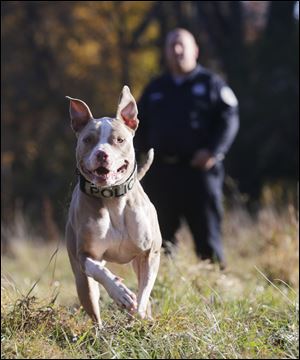
Group trains ‘pit bulls’ for use by police
Toledo department probably won’t participate, official says
12/26/2016The traditional mix of canine breeds used in law enforcement is beginning to see some new variety.
Most people envision a police dog as a German shepherd, Belgian malinois, bloodhound, or maybe a Labrador retriever.

K-9 Kiah is the closest K9 Detection Program ‘pit bull’ to Toledo. She works with Poughkeepsie, N.Y., police Officer Justin Bruzgul and is trained for detecting narcotics and missing persons but also spends time in the community.
But some are hoping to change that by introducing mixed-breed shelter dogs that many call “pit bulls.”
New York-based Animal Farm Foundation and Texas-based Universal K9 have partnered for about two years to train rescue dogs and donate them to departments across the country.
“We train them to do the same work traditionally reserved for purebred dogs,” Stacey Coleman, executive director of the foundation, said.
The K-9 Detection Program has placed about 15 to 20 canines, and another class of dogs will graduate soon.
“The reason we do all of it is to change that negative stigma,” Mrs. Coleman said. “It’s a big deal for our mission.”
Universal K9 acquires and trains the rescued dogs, while Animal Farm Foundation sponsors the training for police officers becoming K-9 handlers through the program.
Brad Croft, owner and trainer at Universal K9, used to buy, train, and sell purebred German shepherds for police work. He later changed the business to a nonprofit that rescues, trains, and donates shelter dogs.
“A few years into it, I realized that there were a ton of dogs in shelters that had some of the same capabilities, and there were tons of police departments out there that needed these dogs and couldn’t afford them,” he said. “It doesn’t take a special breed of dog to do this type of work. It’s a God-given gift. Either a dog has it or they don’t.”
Mr. Croft said a dog of any breed can have the high-energy, high-drive personality needed for police work, and those canines often do not fare well in a shelter environment and are difficult to adopt out.
“Those are the dogs that end up getting euthanized because they do not do good in homes,” he said. “We’re helping so many different things with one stroke by saving dogs, helping law enforcement, and saving taxpayer dollars.”
A traditional police dog generally costs $15,000 to $20,000, not including equipment. The nonprofit program has been generally well received.
“We’ve had great reception in law enforcement,” Ms. Coleman said. “We have to make sure that the city and the whole department has buy-in, that they want to be a part of this program.”
The dogs in the program are dual-trained for detecting narcotics or explosives, and patrol tasks such as tracking people and article searches. But they are not trained in bite work for apprehending suspects.
Lt. Brian Twining, leader of the Toledo police K-9 division, said the Glass City likely wouldn’t participate in the program because the division needs dogs trained for all aspects of patrol work, including apprehension.
“I think the idea behind it is great,” he said. “But the start and end point for us is that we need dogs that can do everything.”
He said the department values the health and working guarantees of its vendor, Von der Haus Gill German Shepherds in Wapakoneta, Ohio.
Mr. Croft argues such guarantees are a moot point if the dog is donated.
“It makes sense if you’re spending $15,000 or $20,000 on a dog that you want health guarantees. But if you’re getting the dog for free, what does it matter?” he said. “We have millions of dogs being euthanized each year, and a lot of them can do this work. If there’s a problem with a dog, we can replace that dog very quickly.”
Lieutenant Twining also noted potential logistical issues if the department had to travel to Texas for additional training. The current vendor’s proximity to Toledo makes that process less problematic.
“We don’t want to put ourselves in a position that could make it difficult for us down the road,” he said. “The problem we get into is the expenditure for more training.”
The closest K9 Detection Program “pit bull” to Toledo is K-9 Kiah in the city of Poughkeepsie, N.Y.
Last month, she earned the prestigious public service award from the American Society for the Prevention of Cruelty to Animals.
Her handler, Officer Justin Bruzgul, said Kiah has been an outstanding partner.
“She loves to work and is ready to go at all times,” he said. “Kiah has an extremely high drive, and when it’s time to let her perform, she puts in 110 percent. At home in our off time, Kiah has plenty of time to relax and play with our four other dogs. However, she knows when I open up the door to the police car it’s time to work.”
Kiah is trained for detecting narcotics and missing persons, but also spends a lot of time out in the community with Officer Bruzgul.
“We are all working very hard to show everyone the underlying potential of everyday dogs, including rescued ‘pit bull’ dogs, which are not traditionally used for law enforcement work,” he said. “This program is definitely shattering stereotypes and negative perceptions of ‘pit bull’ dogs.”
Contact Alexandra Mester: amester@theblade.com, 419-724-6066, or on Twitter @AlexMesterBlade.